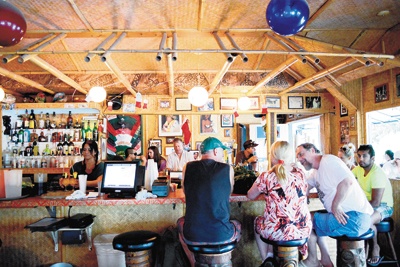LIHUE — The Environmental Protection Agency announced Tuesday that it has reached a legal settlement with Tahiti Nui Enterprises for its “longstanding failure” to close three large capacity cesspools at its Hanalei restaurant and bar nearly eight years after discovering
LIHUE — The Environmental Protection Agency announced Tuesday that it has reached a legal settlement with Tahiti Nui Enterprises for its “longstanding failure” to close three large capacity cesspools at its Hanalei restaurant and bar nearly eight years after discovering the violations.
Spokesman Dean Higuchi said the EPA tried working with the owners of Tahiti Nui Restaurant and Tiki Bar — a favorite North Shore hangout and a filming location for the movie “The Descendants” — to provide ample time to come into compliance.
“In this case, it was just dragging on too long,” he said. “So that’s why we went the enforcement route.”
The settlement includes a $69,000 penalty, which is significantly lower than the $177,500 — the maximum authorized under the Safe Drinking Water Act — discussed by the EPA in 2012. Additionally, Tahiti Nui closed its three cesspools and completed installation of an approved septic tank wastewater system in October 2013.
“The restaurant’s illegal cesspools posed a significant risk to underground sources of drinking water and nearby surface waters,” Jared Blumenfeld, EPA’s Regional Administrator for the Pacific Southwest, said in a release.
In a written statement Tuesday, the Marston family, which owns Tahiti Nui, said it cares deeply about the Hanalei watershed and Kauai’s environment, and has been part of the North Shore community for over 50 years. In attempts to go above and beyond EPA’s requirements, the Marstons said they hired Envirocycle Worldwide and sustainable resources group (SRGII) to design and construct a state-of-the-art aerobic treatment system.
“The EPA was unwilling to grant the additional time needed to construct the most sustainable system, therefore, Tahiti Nui was forced to go forward with the lesser system,” The Marston family wrote in an email.
Nanea Marston, general manager of Tahiti Nui, said that while the family feels the penalty is unfair and could be put to better use, it has no choice but to pay up.
“I don’t know how we’ll do it,” she said. “Definitely can’t do it all at once. We haven’t got that far.”
The EPA said in its release that cesspools are used more widely in Hawaii than any other state and discharge raw sewage into the ground, where disease-causing pathogens and other contaminants can pollute groundwater, streams and the ocean.
“EPA had inspected the Tahiti Nui restaurant numerous times for large capacity cesspool violations, and over the course of several years, tried to work with the owner, Christian Marston, to bring his facility into compliance,” EPA officials wrote in their release.
In 2006, Marston acknowledged the operation of the cesspools and hired a professional engineer to design a state-approved wastewater system to replace the cesspools, according to the release. However, during a re-inspection in 2010, EPA discovered the cesspools were still in use and issued a violation notice, followed by a formal enforcement action in 2012.
Over 3,000 large capacity cesspools statewide have been closed, many through voluntary compliance, since the ban started in 2005, according to EPA.
The banned, large capacity cesspools include those discharging untreated sewage from multiple residential dwellings, and from non-residential locations that have the capacity to serve 20 or more people per day. EPA regulations prohibited new large capacity cesspool construction after April 2000 and required the closure of existing large capacity cesspools as of April 2005. The regulations do not apply to single-family homes connected to their own individual cesspools or to non-residential cesspools that do not have the capacity to serve 20 or more people, according to the release.
“It’s an ongoing thing,” Higuchi said. “We are encouraging everyone — if you have one, if you think you have one — to check it out.”
• Chris D’Angelo, environment writer, can be reached at 245-0441 or cdangelo@thegardenisland.com.


